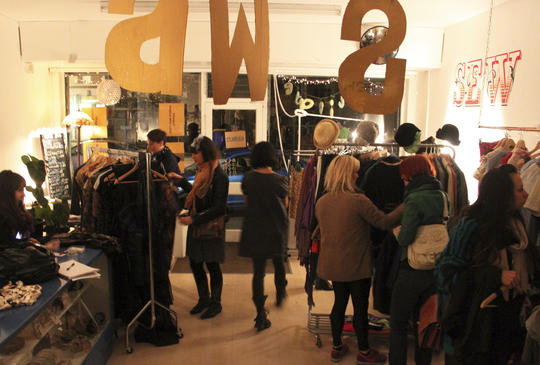
Green trends: how responsible is Manchester fashion?
From the increasing popularity of ‘fast fashion’ where clothes become throwaway novelty items, to the resource-intensive methods of manufacturing methods, the fashion industry presents a wide range of problems for sustainability. But in Manchester we’re gradually seeing small pockets of positive activity that are supporting a more responsible and ethical industry.
Alison Welsh is a designer and head of Manchester Metropolitan University’s Department of Apparel. She says MMU is putting an increasing focus on sustainability across the board. “We encourage it on all fronts, from staff projects on sustainable issues, to a PhD student writing on recycling. We’re also in the process of setting up a responsible fashion MA which will launch in 2015.”
“Increasingly employers are looking for students who have an awareness of sustainability,” continues Welsh. “Obviously fashion is a profit-making machine, and businesses are interested in making a profit. So we have to recognise that our students have to get jobs in the real world and pay the rent. But there are companies out there that have got a sustainable head on.”
The department’s MA Fashion Innovation students have the opportunity to visit and learn from Brandix, a Sri Lankan company that has won awards for its commitment to working sustainably. “We’re producing the next generation of fashion professionals, so it’s then over to them to ensure the fashion industry as is green and responsible as it can be,” says Welsh. “We encourage students to look at the supply chain and investigate methods of making it more responsible.”
As a designer herself, Welsh is interested in ethical fabrics and organic textiles. She’s been researching the cut and construction methods of traditional Indian costume since 2006. “I’m working with Kala cotton, which is rain-fed and doesn’t have to be watered. It’s quite scratchy but really lovely, unlike any other cotton.”
Welsh believes individuals have a crucial role to play in making the fashion industry more responsible. “Raising awareness is important. I think since 2008 people have reined in; I think that helped in a way. Of course there are businesses producing cheap clothes but quality is a key factor in what people buy. Maybe I’m being optimistic but I do feel there’s a move towards producing clothes that have got some sort of meaning.”
Raising awareness of responsible fashion among designers and consumers is a central goal at Stitched Up. Launched in 2011 by a group of designers, makers and campaigners, the cooperative promotes ethical fashion through garment-making and upcycling workshops from their Chorlton HQ. Run by Kelly Joseph, Emily Wade and Bryony Moore, the grassroots collective also offers drop-in sessions, clothes swap events, sewing machine hire and social gatherings in an attempt to offer a real community space that’s an alternative to soulless high street chains.

Stitched Up Clothes Swap, March 2014
“What we think Manchester currently needs is a place and a reason to bring everyone together and create a really vibrant community and a movement around sustainable fashion,” says the Stitched Up team. “It has been really exciting to see the interest in sewing and upcycling grow and grow. We’re all creative people with a passion for sustainability and we’ve all found in our own lives that the act of making and repairing your own clothes builds an understanding of the value of these skills. If you’ve ever made your own shirt, you’ll marvel at the fact you can buy one for a fiver on the high street.”
Sustainability is at the core of all Stitched Up activities. “When you come into our HQ, we’ll tell you that our haberdashery is 100% reclaimed. When we run a workshop, we let people know that the materials we’re using have been diverted from landfill. We never spring a lecture on people about what they choose to buy. But our day-to-day activities raise awareness in a subtle way, by revealing alternative fashion choices that are far more fun and creative than the standard high street shopping experience.”
Stitched Up is also in the process of putting together some curriculum-linked educational workshops for high schools, which combine a creative making element with learning about the serious impacts fast fashion has on people and the environment.
Other initiatives in Manchester that support sustainable fashion include Recycle for Greater Manchester’s annual recycled fashion show; and TRAID’s involvement in local events which see unwanted textiles repurposed and sold online. There is also a growing number of individual designers in the city who focus on sustainable fabrics and production, including Sara Li Chou Han, Tracey Cliffe, Silvia Hoya Mena and Made in the Mill.
Main Image: Dresses by Alison Welsh
Programming sustainability at the BBC: Albert, cultural change and technology
Contributed by Beth Perry
Contributor Profile
Clare is a journalist covering culture and social affairs. With a degree in law and masters’ in journalism, her work has been published in The Guardian, The Huffington Post, Digital Spy, Creative Tourist and many others. Born in Ireland, Clare lived in Luxembourg and Texas, before settling in Manchester.




